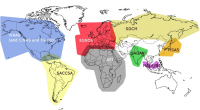If you wish to contribute or participate in the discussions about articles you are invited to contact the Editor
Other SBAS: Difference between revisions
Rui.Pereira (talk | contribs) m (moved Other SBAS to Work in Progress:Other SBAS) |
Rui.Pereira (talk | contribs) mNo edit summary |
||
| Line 38: | Line 38: | ||
* ''For SBAS, setup and activity of Working Groups, staffing of African GNSS programme management entity, training of African experts, preliminary backbone infrastructure development and initial operations.'' | * ''For SBAS, setup and activity of Working Groups, staffing of African GNSS programme management entity, training of African experts, preliminary backbone infrastructure development and initial operations.'' | ||
The expected result is:<ref name="JAES_AP"/> | The expected result is:<ref name="JAES_AP"/> | ||
*''Building of core technical capacity for SBAS (Satellite Based Augmentation Service) within relevant African | *''Building of core technical capacity for SBAS (Satellite Based Augmentation Service) within relevant African organizations in each region and implementation of preliminary backbone infrastructure.'' | ||
According to the JAES action plan, the list of entities involved in these activities comprises:<ref name="JAES_AP"/> | According to the JAES action plan, the list of entities involved in these activities comprises:<ref name="JAES_AP"/> | ||
Revision as of 16:06, 2 September 2011
| Other SBAS | |
|---|---|
| Title | Other SBAS |
| Author(s) | GMV |
| Level | Basic |
| Year of Publication | 2011 |
SBAS systems are spreading out all over the world. More and more, it is believed that upon dual-frequency SBAS service provision, a seamless navigation will be possible from and to any two locations in the world.
From all the SBAS systems in the world, three are already operational (WAAS, MSAS and EGNOS), three are under implementation (GAGAN, SDCM, SNAS) while others are under feasibility studies; SACCSA, Malaysia and African SBAS. These last SBAS systems will be explained briefly in this article.
SACCSA
The SBAS initiative in South/Central America and the Caribbean is called SACCSA (Soluciόn de Aumentaciόn para Caribe, Centro y Sudamérica).[1] SACCSA is an ICAO project founded by the Participants/Member States of the SACCSA Project: Argentina, Bolivia, Colombia, Costa Rica, Guatemala, Panama, Spain, Venezuela and COCESNA (Corporación Centroamerica de Servicios de Navegación Aérea). The objective is to study the improvement of the Air Navigation Environment in the Caribbean and South America (CAR/SAM) Regions with a SBAS solution. The program began in 2003 being at present in its Phase III which will determine the feasibility of the implementation of an own SBAS system in the CAR/SAM regions.[2]
Malaysia
In Malaysia a future SBAS system is under study.[3] As of 2008, the planned implementation was:[4]
- 2009-2010: Feasibility Study Phase
- 2011-2015: Development Phase
SBAS in Africa
SBAS introduction in Africa aiming to support Air Transport Sector and Satellite Navigation is one of the top priorities of the Africa-European Union cooperation.
During the Seventeenth Meeting of the AFI Planning and Implementation Regional Group (APIRG) in Burkina Faso from 2 to 6 August 2010,[5] the African Commission for Civil Aviation (AFCAC) informed that the provision of SBAS over the Africa-Indian Ocean (AFI) Region was being considered in the frame work of Africa-European Union strategic partnership, and that the implementation plan would be discussed at the third Africa-EU Summit in Libya on 29-30 November 2010. The implementation is studied in terms of an extension of EGNOS system to the AFI Region.[6]
During the third Africa-EU Summit,[7] an action plan for the years 2011-2013 was agreed to implement the Joint Africa EU strategy.[8] As anticipated by AFCAC, this action plan included specific tasks on SBAS as part of the priority number 2 of the partnership on infrastructure. In particular, the following action was stated (verbatim):[8]
- For SBAS, setup and activity of Working Groups, staffing of African GNSS programme management entity, training of African experts, preliminary backbone infrastructure development and initial operations.
The expected result is:[8]
- Building of core technical capacity for SBAS (Satellite Based Augmentation Service) within relevant African organizations in each region and implementation of preliminary backbone infrastructure.
According to the JAES action plan, the list of entities involved in these activities comprises:[8]
- African Union Commission (AUC).
- Regional Economic Communities (RECs).
- United Nations Economic Commission for Africa (UNECA).
- Agence pour la Sécurité de la Navigation Aérienne en Afrique et à Madagascar (ASECNA).
- African Civil Aviation Commission (AFCAC).
- Arab Civil Aviation Commission (ACAC).
- European Space Agency (ESA).
- European Aviation Safety Agency (EASA).
- Single European Sky ATM Research Joint Undertaking (SESAR JU) .
Notes
References
- ^ SACCSA homepage
- ^ Agenda of the Seventh Coordination Board Meeting of the SACCSA project, ICAO's South American Office, Lima, Peru
- ^ Announcement of Workshop on Ionospheric Modeling for Malaysian SBAS, December 2010, ANGKASA homepage
- ^ Update on Malaysian GNSS Infrastructure, Presentation at ICG-3 Meeting, Pasadena, USA, December 2008.
- ^ Seventeenth Meeting of APIRG (APIRG/17), Ouagadougou, Burkina Faso, 2–6 August 2010)
- ^ ICAO paper of an independent cost-benefit benefit analysis for an AFI SBAS
- ^ Homepage of the 3rd Africa-EU Summit
- ^ a b c d Joint Africa EU Strategy Action Plan 2011-2013

